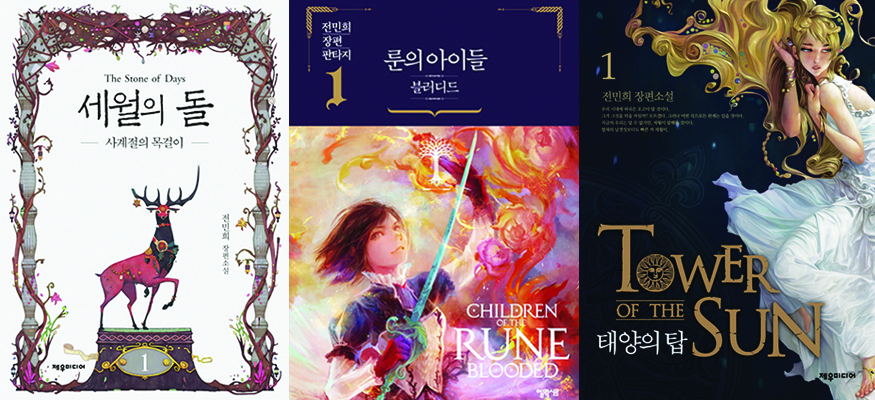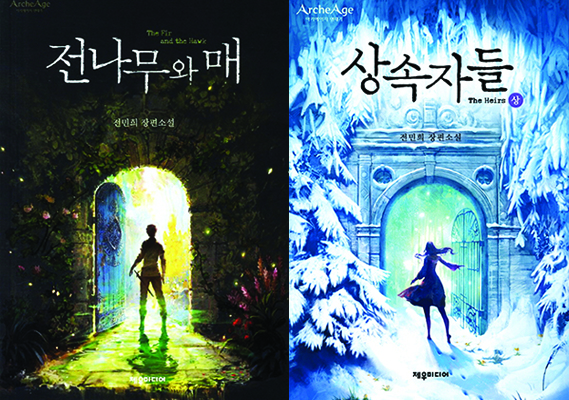|
Author Jeon Min-hee Publishing Abroad Requires Faithful Translation and Cultural Understanding
2019.06.10
Author Jeon Min-hee is a fantasy novel writer who started her career with the serial novel The Stone of Days in the late 1990s on Nownuri, a now-defunct internet platform in South Korea. Since then she has penned novels like the Children of the Rune series, the Archeage Chronicles series, The Stone of Days (Jeu Media) and Tower of the Sun (Jeu Media). Among these, Children of the Rune and Archeage Chronicles have been adapted into PC games called “Talesweaver” and “Archeage”.
We are very happy to feature you in the webzine. Please introduce yourself to our readers, who are mainly publishing experts overseas.
Hello, I am Korean novelist Jeon Min-hee, writer of works like Arund Chronicles, Children of the Rune and Archeage Chronicles. It is great to meet you.
Late in 2018, you published Children of the Rune: Blooded. It was 11 years after the previous part had been published, Children of the Rune: Demonic. That clearly must have meant a lot to you. Could we ask what you've been up to over the past decade beside writing the new part of your series?
Children of the Rune first began in 2001 and it ended with the second part in 2007. After that, there was nothing new for this series, and in the meantime, I worked on Archeage Chronicles. I participated in planning and creating the game adaptation of the novel, so I think time just flew by for me. I also wrote Tower of the Sun and raised my child as well.
Paper copies of Children of the Rune's 'Winterer' and 'Demonic' are no longer being printed. The revised edition of the novel was also made available on Kakao Page and not on paper. I think you're planning a change regarding platforms on which to meet your fans. Was there a special reason behind this decision?
While Children of the Rune was taking a break, web platforms for online novel series and writers all newly emerged. I felt there were many, many more readers than before. Previously, I thought fantasy fans only read fantasy novels, but nowadays, after web novels gained momentum, I realized readers read all sorts of genres. That made me want to jump into this giant market and spread my wings there.
The Stone of Days, Children of the Rune, Tower of the Sun
Did the unique online novel publishing method change the way you write your stories?
Because it was a new trend for me, I started reading a variety of novels. Some parts I enjoyed, viewing them as fun changes, but others I just couldn't follow. I think I found the right middle ground for myself. Also, I think the speed in which my stories progress has changed over the years, and thankfully, web novels showed a similar trend, so it was coincidentally convenient for me. I also had to keep in mind the fact that many readers read web novels on their smartphones, with less patience they have when reading traditional books.
I was fascinated byfact thatthe the parts overseas readers
Your novels have been translated and published in countries like Japan, China, Thailand and Taiwan. One can think readers there may understand or emotionally engage in the books in a different manner than readers in South Korea. Is there a huge difference?
Geographically these countries may be closer to us than others, but national character and style - these things are all different. So, when my novels were first published outside South Korea, I thought their reactions would be beyond my expectations, but to my surprise, foreign readers liked the same parts Korean readers did, and they were touched by the same situations as well. I was fascinated by the fact that the parts overseas readers liked in my books were nearly the same as those Korean readers like. Perhaps my books appealed to a broad emotion that mankind has, I thought.
Does anything come to your mind specifically when it comes to foreign reader reactions? If there was some unique feedback, do tell us.
When the novels were published overseas, Japanese readers would send me emails through their phones, and I was just fascinated by how even the email addresses were different and the email content was contrasting too. In Japan, they have online 'threads' where a piece of writing can be continuously updated, and notices can also be sent out, like regarding publishing dates. That was all quite fun in the beginning.
You're the novelist who's had the most Korean novels sold in Japan and also read by Japanese teenagers. Can you give us some insight into your popularity in Japan and any special episodes that stand out, if any?
After my novels were first released in Japan, I scrutinized the feedback with a translating device. But as time progressed, I grew a bit distant and stopped keeping close tabs as I couldn't read the feedback without a translation device. Then one day, I chanced upon the fact that there was so much fan art in Japan regarding my novels. It's been a few years since my novels were first published in Japan, but there is still new fan art being produced to this day, and fans don't hesitate in telling me my novels were their favorite books growing up. That's when I truly feel there are many people who like my work to this day.
The Fir and the Hawk, The Heirs
We looked at the countries where your books have been published outside South Korea and noticed your work hasn't been introduced in English-speaking countries. Seeing how you've been so successful in other countries you've exported your books to, it must have occurred to you to try selling your books in English-speaking countries. Was there a special reason you opted not to?
In the case of overseas countries where my books have been exported to, they got in contact with us first. We never really tried exporting the books but rather, foreign publishers reached out to us after they had already become familiar with the content material. We just never got similar calls from English-speaking countries (laughs). I think one time, someone from Germany asked for an English copy of one of my novels because they wanted to consider publishing it, but we didn't have an English translation, and the deal fell through. I think it'd be nice to have my work published in a number of other countries if I had English versions.
You're the original author of the work that created the bases for Archeage the game, which is now being played in different countries around the world. We've heard many fans of the game are interested in the book - could you give us a brief introduction?
In the case of “Archeage” the game, it's being serviced in countries in North America, Europe and Asia (China and Russia). It's very popular as well, so I understand there would be fans who want to know about the original novel. In English-speaking countries, the storyline behind “Archeage” is pretty well known, so I would think Archeage Chronicles would be more popular than Children of the Rune. We also get many questions regarding Archeage Chronicles from overseas readers.
I think it's important to have changes that fit in with different cultures
Exporting novels can be delightful work, but there can always be worries over whether some content may become lost in translation. If there are specific parts you pay attention to when it comes to copyright exporting or translation work, can you tell us?
First of all, I think good translation is key. I realized when we were working on my Japanese publications that it is very difficult to have translations that are true to the original content while they help readers read the books easily. Now I think I'm more focused on having translations that are the latter. I am fully aware it's difficult work moving the essence of the work unharmed across different languages. This is why I think it's important to have changes that fit in with different cultures that help readers outside South Korea understand the content as long as it doesn't greatly harm the original work's intention.
Cover art and illustrations are also important to readers. We heard the feedback from your cover art for your Japanese publications was positive, whereas the Chinese reaction for your Chinese novels was not. What are your thoughts on illustrations for foreign translations of your work?
Preferences for illustrations can vary among different countries, and I think the reaction can be different based on what you focus on for your cover art. In some cases, a Korean reader can look at the cover art for a different country and feel it's strange, but I don't think it's a huge problem. Previously, when we were working on a novel for Japan, the physical characteristics of the main character in the novel were not reflected in the cover art. For instance, the character was supposed to have long hair, but on the cover art, we saw short hair. We asked the artist to change the hair in that instance, but if it's not something as major as that, we'll try to fully respect cultural differences.
I think if you're adapting a book into a game,
You've had experience working with other collaborators to create game worlds. Do you have other genres you'd like to work on for secondary creations, like webtoons, television dramas or movies?
In the past, I was sceptical my work could be adapted into films but seeing how far technology has come; I think it could be possible now. Due to time constraints, perhaps a television drama adaptation could be more viable than a movie. There is also so much fan art for my novels, so an animation film or comic adaptation could also be possible. From my experience in helping create a game, I realized I can't have everything exactly how I want it because so many people are involved in the adaptation and a whole different product is being created. I'm not one to cry over details being changed. In the case of games, some readers want the game to be exactly how the novel is, but I think if you're adapting a book into a game, you need to change things to fit the medium because all media have their own varying ways of delivering messages and fun.
You probably have so many more stories to publish to wrap up your series. If you have any stories that are must-writes for you, please tell us.
Yes, I have many stories I need to tell within my novels' worlds. There is only three books' worth of stories out for Archeage Chronicles, but this is only one-twentieth of what I have planned. And the third part of Children of the Rune was just published, but we have people asking for the fourth part already, and I'm thinking about it.
〈Jeon Min-hee Fan Meet & Greet〉
Arranged by Choi Hyo-jun
|
Pre Megazine
-

Jakkajungsin Publishing Co.
VOL.69
2024.04 -

Writer Yun Jung-Eun
VOL.69
2024.04 -

Jumping Books Publishing House
VOL.68
2024.03 -

Writer Kim Hwa-Jin
VOL.68
2024.03 -

Publisher Hyohyung
VOL.67
2024.02 -

Writer Minha
VOL.67
2024.02 -

Almond Publishing
VOL.66
2024.01 -

Writer Kwon Jung-Min
VOL.66
2024.01 -

Hakgojae Publishers
VOL.65
2023.12 -

Writer Kim Hye-Jung
VOL.65
2023.12 -

Eidos Publishing House
VOL.64
2023.11 -

Writer Hwang In-Chan
VOL.64
2023.11 -

Munhakdongne
VOL.63
2023.10 -

Writer Chang Kang-myoung
VOL.63
2023.10 -

Happywell Publishing
VOL.62
2023.09 -

Writer Baik Soulinne
VOL.62
2023.09 -

Dasan Contents Group (Dasan Books)
VOL.61
2023.08 -

Writer Lim Kyoung-Sun
VOL.61
2023.08 -

SpringSunshine Publishing Co.
VOL.60
2023.07 -

Writer Lee Kyung-Hye
VOL.60
2023.07 -

Human Cube
VOL.59
2023.06 -

Doctor Jeong Jae-Seung
VOL.59
2023.06 -

Anonbooks
VOL.58
2023.05 -

Writer Son Bo-Mi
VOL.58
2023.05 -

Namhaebomnal
VOL.57
2023.04 -

Writer Kim Bo-Young
VOL.57
2023.04 -

Hugo Publishing
VOL.56
2023.03 -

Writer Cho Kwang-Hee
VOL.56
2023.03 -

Balgeunmirae Publishing Co.
VOL.55
2023.02 -

Writer Lee Byung-Ryul
VOL.55
2023.02 -

Wisdom House, Inc
VOL.54
2023.01 -

Writer Jeong Jia
VOL.54
2023.01 -

Humanitas
VOL.53
2022.12 -

Writer Kim Yeon-Su
VOL.53
2022.12 -

Songsongbooks
VOL.52
2022.11 -

Writer Eun Hee-Kyung
VOL.52
2022.11 -

Bombom Publishing Co.
VOL.51
2022.10 -

Writer Jiwon Yu
VOL.51
2022.10 -

Hangilsa Publishing Co., Ltd.
VOL.50
2022.09 -

Writer Kim Won-Young
VOL.50
2022.09 -

Moksu Publishing Company
VOL.49
2022.08 -

Writer Yoo Sun-Kyong
VOL.49
2022.08 -

Next Wave
VOL.48
2022.07 -

Writer Park Sang-Young
VOL.48
2022.07 -

A Thousand Hopes
VOL.47
2022.06 -

Writer Bora Chung
VOL.47
2022.06 -

Woongjin ThinkBig
VOL.46
2022.05 -

Dr. Oh Eun-Young
VOL.46
2022.05 -

JECHEOLSO Publishing House
VOL.45
2022.04 -

Writer Jang Ryu-Jin
VOL.45
2022.04 -

Changbi Publishers
VOL.44
2022.03 -

Writer Kim Ho-Yeon
VOL.44
2022.03 -

Mati Books
VOL.43
2022.02 -

Writer Lee Kkoch-Nim
VOL.43
2022.02 -

Picturebook Gongjackso
VOL.42
2022.01 -

Writer Kim Sang-Wook
VOL.42
2022.01 -

Writer So-yeon Park
VOL.42
2022.01 -

Writer Yoo Eun sil
VOL.42
2022.01 -

Kungree Press
VOL.41
2021.12 -

Writer Kim Lily
VOL.41
2021.12 -

Writer Park Yeon-jun
VOL.41
2021.12 -

Writer Yi Hyeon
VOL.41
2021.12 -

A deeper world told through picture books 'Iyagikot Publishing (Story Flower)'
VOL.12
2019.06 -

Author Jeon Min-hee
VOL.12
2019.06 -

Illustrator Kim Hwan-Young
VOL.13
2019.07 -

Travelers sailing through the sea of knowledge - 'Across Publishing Group Inc.'
VOL.13
2019.07 -

Genre Novel Publisher 'Arzak Livres'
VOL.14
2019.08 -

Author Lee Yong-han
VOL.14
2019.08 -

Wookwan Sunim
VOL.15
2019.09 -

East-Asia Publishing
VOL.15
2019.09 -

Author Jo Jung-rae
VOL.16
2019.10 -

EunHaeng NaMu Publishing
VOL.16
2019.10 -

Writer Heo Kyo bum
VOL.40
2021.11 -

Writer Kim So-Young
VOL.40
2021.11 -

Author-illustrator Kim Sang Keun
VOL.40
2021.11 -

ACHIMDAL BOOKS
VOL.40
2021.11 -

Author Kang Gyeong-su
VOL.17
2019.11 -

Moonji Publishing Belongs to the Literary Community
VOL.17
2019.11 -

Author Kim Yun-jeong
VOL.18
2019.12 -

I-Seum
VOL.18
2019.12 -

Kim Cho-Yeop
VOL.19
2020.02 -

Creating a window into the future with books
VOL.19
2020.02 -

Author Serang Chung
VOL.20
2020.03 -

Hey Uhm
VOL.20
2020.03 -

Writer Lim Hong-Tek
VOL.21
2020.04 -

BIR
VOL.21
2020.04 -

Writer Song Mikyoung
VOL.39
2021.10 -

Author-illustrator Kim Dong Su
VOL.39
2021.10 -

Writer Lee Seula
VOL.39
2021.10 -

Tabi Books
VOL.39
2021.10 -

Writer Kim Soo-hyun
VOL.38
2021.09 -

Author-illustrator Lee Myoung Ae
VOL.38
2021.09 -

Writer Hwang Sunmi
VOL.38
2021.09 -

Kidari Publishing Co.
VOL.38
2021.09 -

Writer Sohn Won-Pyung
VOL.22
2020.05 -

Woods of Mind's Books
VOL.22
2020.05 -

Writer Heungeul
VOL.23
2020.06 -

Gloyeon
VOL.23
2020.06 -

Maumsanchaek
VOL.24
2020.07 -

Winners of the 2021 Bologna Ragazzi Award
VOL.37
2021.08 -

Picture book artist Lee Suzy
VOL.37
2021.08 -

Author-illustrator Yi Gee Eun
VOL.37
2021.08 -

Hubble
VOL.37
2021.08 -

Writer Baek Se-Hee
VOL.25
2020.08 -

Bearbooks Inc.
VOL.25
2020.08 -

Author Baek Hee-Na
VOL.26
2020.09 -

Yuksabipyoungsa
VOL.26
2020.09 -

Writer Kang Hwa-Gil
VOL.27
2020.10 -

Kinderland (Bandal)
VOL.27
2020.10 -

Writer Ha wann
VOL.36
2021.07 -

Author-illustrator Myung Soojung
VOL.36
2021.07 -

Writer Jung Yeo-Wool
VOL.36
2021.07 -

Publisher EcoLivres
VOL.36
2021.07 -

Writer Lee Geumi
VOL.28
2020.11 -

Sakyejul
VOL.28
2020.11 -

Writer Kim Keum-Hee
VOL.29
2020.12 -

Geulhangari
VOL.29
2020.12 -

Writer Cheon Seon-Ran
VOL.30
2021.01 -

Hyang Publishing House
VOL.30
2021.01 -

Writer Lee Hee-Young
VOL.31
2021.02 -

Sanzini
VOL.31
2021.02 -

Publisher Prunsoop
VOL.32
2021.03 -

Writer Sim Yun-Kyung
VOL.32
2021.03 -

Hanbit Media
VOL.35
2021.06 -

Hyeonamsa
VOL.33
2021.04 -

Author-illustrator Noh Inkyung
VOL.33
2021.04 -

Writer Cho Won-Jae
VOL.35
2021.06 -

Writer Kim Jung-Mi
VOL.34
2021.05 -

Safehouse Inc.
VOL.34
2021.05














